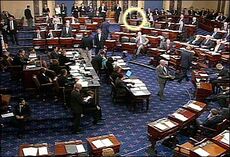Impeachment
| Part of a series on |
| Politics of the United States |
|---|
 |
Under the Constitution of the United States, whoever best convinces the public to elect him to an office, owns it for the entire term of the office. The document makes an exception for judges and the President, whom it is hard for even scandal to dislodge. When the nation wants to discharge these officials due to illness — because the public is sick of them — it turns to the institution of impeachment.
Definition[edit]
Impeachment does not itself remove an official from office. Impeachment is just the official accusation, which sets up a trial. So —
- The House of Representatives votes to impeach an official if Members find it would serve their personal political interest to chuck him out of office. In contrast,
- The Senate conducts the trial, and votes to convict if Members find it would serve their personal political interest to chuck him out of office.
The Constitution calls for impeachment in cases of "high crimes and misdemeanors." For the definition of this, see just above. Unspoken prerequisites for impeachment are that Congress be controlled by the party of which the President is not a member, and that the President's poll numbers are both low and dropping like a rock.
When government is occupied by adults, sometimes the mere threat of impeachment induces action. In 1974, when it became clear that President Richard Nixon had spied on adversaries and the opposition party, and had directed a cover-up, smiling Congressmen in gray suits successfully appealed to him to resign. Gerald Ford took over and jubilantly told the nation that the Constitution had won out. In fact, he meant that the Constitution had been snuck around. (Government has not been occupied by adults since then.)
While impeachments are most often associated with presidents, various federal judges have also been impeached and even convicted, notably when they accept bribes. The problem with impeaching judges is that it enables them to mount successful campaigns for Congress.
Arguments[edit]
Members of the President's party argue that the opposition intends to "overturn the results of the last election" and "substitute its will for the will of the people." This is crap. The people elected the President and a Vice President of the same party at the same time. So the only result is that the ruling party's designated backup candidate would take over. Of course, the Vice President is always an illiterate, bumbling, wimpy fool nominated for the express purpose of inducing loathing at the thought of anything untoward happening to the President — including removal for cause. (The reader is welcome to try to find an exception in U.S. history.)
The President's allies also argue that the drive to impeach is an attack on the office, rather than on his misconduct. They argue that using the procedure called for in the Constitution is a threat to Constitutional government. Uh-uh.
Much tongue-work has gone into the argument that, when sitting for an impeachment, U.S. senators are "jurors." This implies that they should not ask questions, make statements suggesting they have pre-judged the case, have Tetris up on their phones, or throw spitwads. Conversely, legal scholars such as Pigmeat Markham have stated that they serve as 100 "judges." They are all wrong. The senators are self-important windbags well past their shelf dates — as they are when deliberating on any other matters. They are all fixating on their own re-election. When they gaze intently at an impeachment manager, they are actually thinking about how to boil down his argument to fit on a bumper sticker.
History[edit]
England used impeachment in the reign of King Charles I to remove from office and execute the Earl of Strafford for threatening to turn the dogs on the Houses of Parliament in 1641. American lawyers included impeachment (minus the dogs) when drawing up their Constitution in 1787.
Impeachment of Andrew Johnson[edit]
The first President to be impeached was Andrew Johnson in 1868. He became President on the strength of a single bullet, delivered by John Wilkes Booth, at the end of the Civil War. Johnson was a Democrat from Tennessee but called the secession "treason" deserving harsh punishment. But the Radical Republicans (predecessor of the modern Milquetoast Republicans) controlled Congress. They wanted harsher punishment for the South, but Johnson vetoed most of it.
Marksman and theatergoer Booth had replaced Abraham Lincoln with Johnson, but fatefully, Johnson did not replace Lincoln's cabinet. So Edwin M. Stanton remained as Secretary of War (predecessor of the modern Secretary of Defense, Appeasement, and Climate Action). Stanton was a Radical Republican who wanted to force the South to atone for seceding, sing the blues, wear blackface, and smoke Kool menthols. And he wasn't going anywhere.
Johnson barnstormed the nation before the mid-terms, urging voters to elect a Congress more to his liking. It backfired. His speeches were undisciplined and vitriolic and he conducted shouting matches with the hecklers who tailed him. Shades of Donald Trump! Voters gave Johnson's nemeses huge majorities in both the House and Senate. They passed Reconstruction Acts over Johnson's vetoes; dittoes the Tenure of Office Act, forbidding Johnson from firing Stanton. But Congress left town and Johnson did so anyway, installing Ulysses S. Grant as acting Secretary. The Senate overrode this move, but Grant quit, resulting in a falling-out with Johnson that would be a large asset for Grant in the 1868 Presidential election. The re-installed Stanton barricaded himself inside his office.
In February 1868, Congress passed 11 articles of impeachment, for removing Stanton, and for "intemperate, inflammatory, and scandalous harangues". Shades of Donald Trump! and good thing there was no Twitter. The Senate began the trial on March 5, though Chief Justice Salmon Chase thought it was fishy. Since Lincoln's assassination promoted Johnson, there had been no Vice President, which meant that Sen. Benjamin Wade not only had a vote but would become the President. But the Confederate states did not yet have a vote at all.
The first vote was taken on May 16 and it was 35-19 for Guilty — one short of the required two-thirds. The Senate recessed for ten days of courtly horse-trading and arm-twisting, but returning to vote on two more articles of impeachment, the result was the same, and Johnson slunk away.
Impeachment of Bill Clinton[edit]

Bill Clinton was a more notorious recipient of a writ of impeachment. He is called the "first elected President to be impeached," because Americans love firsts and records, and are not sticklers for precision, nor least of all students of history.
In 1994, two years into the term of President Clinton, Congress switched to the opposition Republican Party, which promptly investigated whether the President had committed "high crimes and misdemeanors" that might make him (snicker!) ineligible for office. Congress availed itself of the Independent Counsel Act, derived from the English Star Chamber, which lets Congress give an investigator an unlimited budget with which to incessantly pursue a specific individual to see what dirt can be dug up on him. Unfortunately, the original independent counsel, Robert Fiske, found no impeachable acts; only minor crimes that backslapping politicians always let one another get away with.
The new Congress replaced Fiske with Kenneth Starr, who was, as it's often put in Help Wanted advertising, a self-starting individual with fire in his eyes. Sure enough, through an arcane combination of a talk-show hostess, a harassment lawsuit, and a legal fishing expedition allowed by a women's-rights law Clinton himself signed, Starr parlayed an investigation of insufficiently documented real estate payments and improper firings into a lurid story of oral sex in the White House.

Fatefully, Clinton followed the most recent modern precedent — that set by Richard Nixon — and defended himself by giving the nation a finger-wagging scolding, lying under oath, and getting subordinates to destroy evidence. In 1998, Starr delivered his report to the House Judiciary Committee. The motorcade carrying cardboard boxes of documents to Congress got more TV coverage than any event until the fateful trip of O.J. Simpson's white van. Even more notably, the Starr report was available in paperback, nationwide within three days, wherever fine pornography is sold. The Republicans insisted that the case was not about sex. This is crap. Windy explanations of evasive testimony and five-paragraph definitions of sex — all of which depend on what the meaning of the word is, is — don't sell. Cigar-in-vagina: That, we understand.
The trial moved to the Senate, and as set out in the Constitution, Supreme Court Chief Justice William Rehnquist presided. As not set out anywhere, he wore a black robe with four golden stripes on each arm, like Captain Kirk. Oddly, the Republican Senate declined to hear witnesses, arranged a whirlwind schedule, and came well short of the two-thirds majority that would have removed Clinton from office. But recall that the real question for Senators is which outcome best butters their own political toast. The GOP had a choice between a now-discredited liar, or seating a President Gore, a new face whose biggest lies were still ahead of him. Clinton was cleared for two more years of ineffective governance, which suited the Senate majority fine.
Impeachment of George W. Bush[edit]
This was proposed every month during Bush's presidency, because Washington runs on payback. Attentive readers know why it never happened:
- In Bush's first six years, he controlled Congress. Republicans eat their own babies, but only during election campaigns.
- In Bush's last two years, the Democrats ran Congress. They vilified Vice President Dick Cheney for single-handedly making the Hurricane Katrina flood waters take a sharp right turn toward the black neighborhoods of New Orleans. However, they would not cast a vote that instantly doubled the intelligence and quadrupled the persuasiveness of the White House. That is, the Vice President once again performed his only essential function.
Impeachment of Barack Obama[edit]
Barack Obama's poll numbers fell like a rock during his first two years, but his party ran Congress. Some Republicans charged that Obama was foreign-born and technically unable to be President. They were bound and gagged by their leadership, in favor of smiling and practicing their shuck-and-jive.
Republicans retook the House in January 2011, having campaigned to return the nation to fiscal balance and the military to actual national defense, as they utterly failed to do when they last called the shots. Surprising no one, they again made no progress toward either goal, as they spent all their time considering Obama's "high crimes and misdemeanors."
Impeachments of Donald Trump[edit]
The original[edit]
After the shocking election of President Donald Trump, revenge remained "a meal best served by smiling men in gray suits," though it now included frumpy women in pussy hats. The drive to remove Trump began in 2016 with proposals that:
- Members of the Electoral College pledged to Trump have a sudden attack of conscience and vote for the Dalai Lama or Putney Swope or something;
- Cabinet secretaries whom Trump was likely to nominate meet and vote him unfit to serve under the 25th Amendment;
- Maintenance employees use bricks and mortar to ensure that Trump cannot get into the Oval Office.
When Trump's lieutenants inexplicably declined to remove Trump, the conversation naturally turned to impeachment, requiring another heroic search for High Crimes and Misdemeanors. On the heels of a scripted meeting with top FBI lawmen immediately leaked to east-coast newspapers, Attorney General Jeff Sessions conceded he was too biased in favor of Trump to investigate his crimes.
Special Prosecutor Robert Mueller rose to the occasion and assembled expert lawyers, expert mostly in contributing to the Hillary Clinton campaign, confident that anything rash that Trump did regarding their investigation, such as firing them, could itself be the High Crime of obstruction. The investigators threw several Trump associates in prison just to keep their skills high.
A mere two years and one Attorney General later, Bob Barr told Mueller it was probably time to report. When the dust died down, Congress had not impeached Trump. This outraged the Members, as another election was closing in and Congress had not done anything else either. Speaker Nancy Pelosi threw it open to four of her committees to find those High Crimes, issue subpoenas, and see if Trump began to react so poorly as to finally be grounds for removal.
The basis was, as set out above, that the House was controlled by the opposition Democrats. The obvious obstacle was that the Senate, which would conduct the Fair Trial, was controlled by Trump's own party. The Vice President again served his only important function, to make the nation not want mishap to befall the President: Mike Pence was squeaky clean and would surely turn White House press conferences into tent revivals no one in the Press Corps could sit through.
The nominal basis, by comparison, was that Trump had phoned the President of Ukraine, Volodymyr Zelensky, and uttered the key phrase, "Do me a favor." Favor-trading with a foreign government, only years after Hillary charged that Trump had been favor-trading with incontinent Russian prostitutes, had to be a High Crime. The President had to be removed and there was no time to waste — until Speaker Pelosi stuck the Bill of Impeachment in her brassiere for a full month. In January 2020, however, Pelosi took it out, had it fumigated, and walked it over to the Senate. Though the original favor was that Ukraine help Trump investigate a Joe Biden payola, now Joe was pressing flesh in the run-up to the Iowa caucuses, while each of his opponents for the nomination would be sat in Washington for weeks of emergency lawyering.
Trump was acquitted on an almost party-line vote. The only point of the whole endeavor was to give Mitt Romney one more chance to stab other Republicans in the back.
The sequel[edit]
A year later, Congress had still done nothing and Biden appeared to have defeated Trump for the Presidency. However, on the day in January 2021 when Pence was to officially count the Electoral Votes, Trump — who had not been successful arm-twisting Pence to "do it wrong" — called ten thousand backers to Washington and gave a bang-up pep talk — so excellent that it must have been the cause of the mayhem already taking place a mile away at the Capitol. So open-and-shut was this case that the House needed no hearings nor witnesses.
On Inauguration Day, Trump surprised everyone and quit the White House for Mar-a-Lago, where no one bats an eye when he slathers his steak with ketchup. But the Senate still ached to strip Trump of the office he had just left. Impeachment II: A New Beginning but with Suspiciously Familiar Plot Twists established new precedents:
- The person to be removed from office need not be in office.
- The Chief Justice need not preside over the trial.
- You can have the President pro tempore of the Senate run the trial even though he already voted Guilty last year.
- You can ditch the witnesses and play home videos.
The possibilities were endless. Republicans warned that, once they regained Congress, they could re-impeach Bill Clinton, or give Barbra Streisand her first, or even Oliver Cromwell. This last had already been exhumed, dressed up, and tried in Parliament, but no American would know that. Forty-four Republicans voted that the whole thing was not legitimate. That meant that it was.
After a week of debate, it was time to vote on the ostensible question of whether Trump had incited insurrection to plunge the nation into Civil War — and the real question, "Does Trump annoy you?" But then the Senate voted that it wanted to hear witnesses after all. However, even this was not on the level:
| “ | Your Honor, I want to change my vote and join the Democrats in calling for witnesses. Our side has 300 of our own. They will retell former President Trump's own story that Venezuela hacked every voting machine in America; will send some of the feces spattering toward Speaker Pelosi; will halt action on the Biden budget, Biden cabinet nominations, Biden judges, and Biden law changes; and will make everyone watch the Senate spinning its wheels, giving a majority-but-not-two-thirds vote, and then nothing happening. | ” |
—Sen. Lindsey Grahamnesty (R-SC) | ||
Both sides suddenly agreed that calling witnesses was too clever by half — and showing America that every established faction in Congress was really sick of Trump would put his 2024 comeback on third base. They compromised at putting the Washington phone book into evidence, wrapping up the trial the same day, 57-43, and hoping no one noticed. Republicans Richard Burr (NC) and Bill Cassidy (LA) had the distinction of voting both that the trial was illegal and that it should throw Trump out of office — oh, right, he's already gone.
Impeachment of Joe Biden[edit]
In the 117th Congress, newly elected Rep. Marjorie Taylor Greene (Q-GA14) filed a bill to impeach President Joe Biden. She at least waited until the first day of his term, whereas the Democrats re-tried Trump after his last day. Greene charged Biden with the High Crime of being in the back pocket of China and Ukraine. The plenary session sent the bill to Judiciary — filing it between their bin liner and the wastebasket itself. The episode was another first for Congress, the first time it had processed impeachments of two presidents at the same time.
The fact that the new President's own party controlled the House — which meant Greene's bill wasn't going anywhere — would turn out to be the least of her problems, as the House also voted that she "doesn't play well with others." However, the President typically loses support in the midterm elections. Greene supporters eagerly await the 2022 elections and a Republican 118th Congress, and are even now checking the supply of popcorn in their basement bomb shelters.







